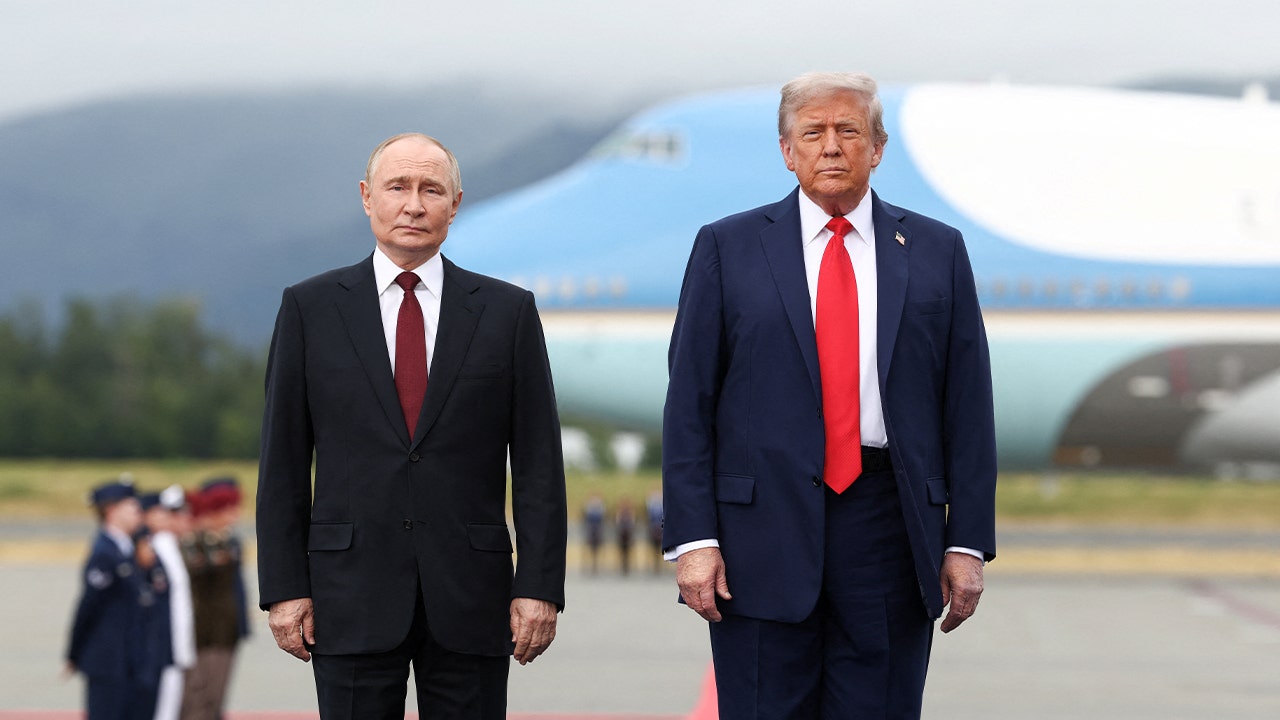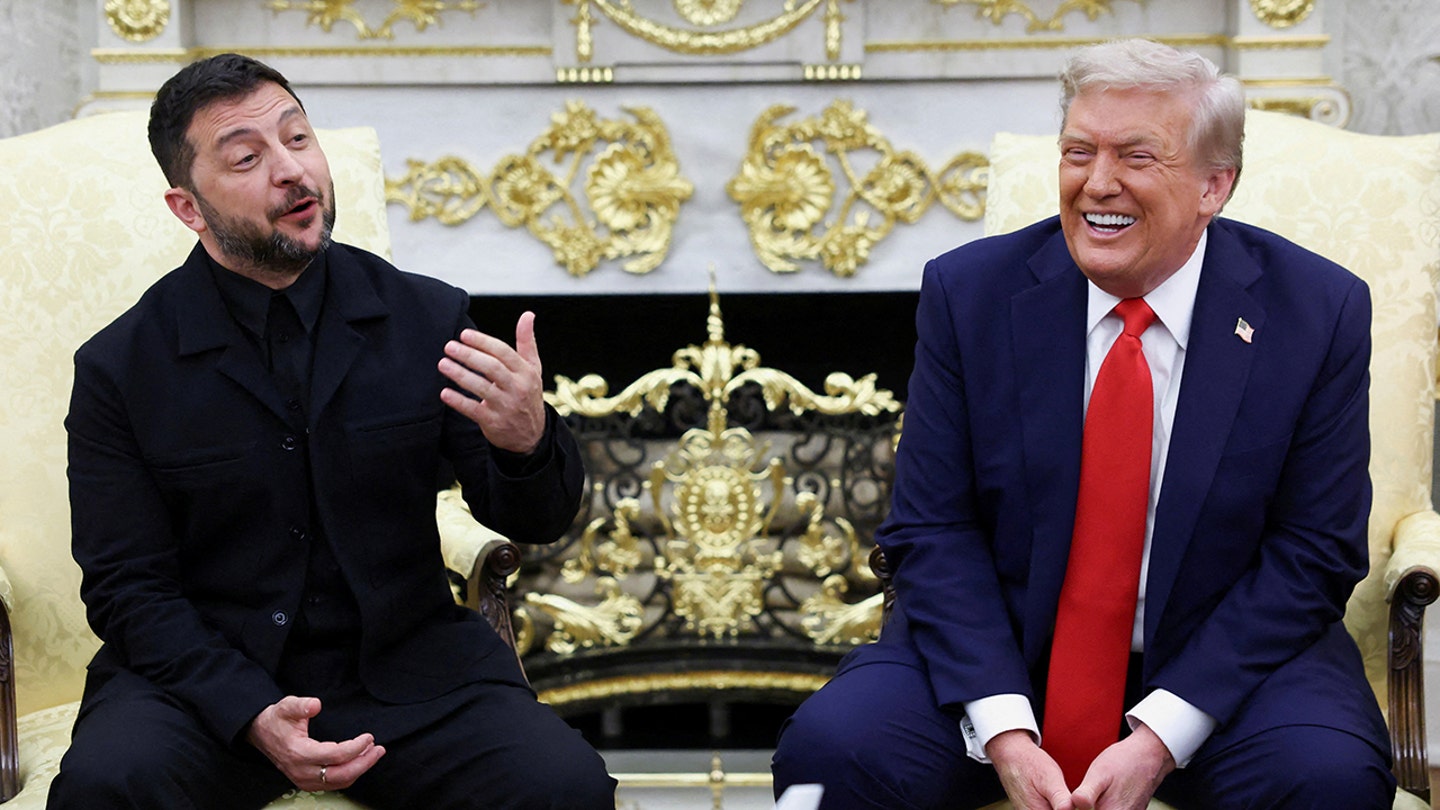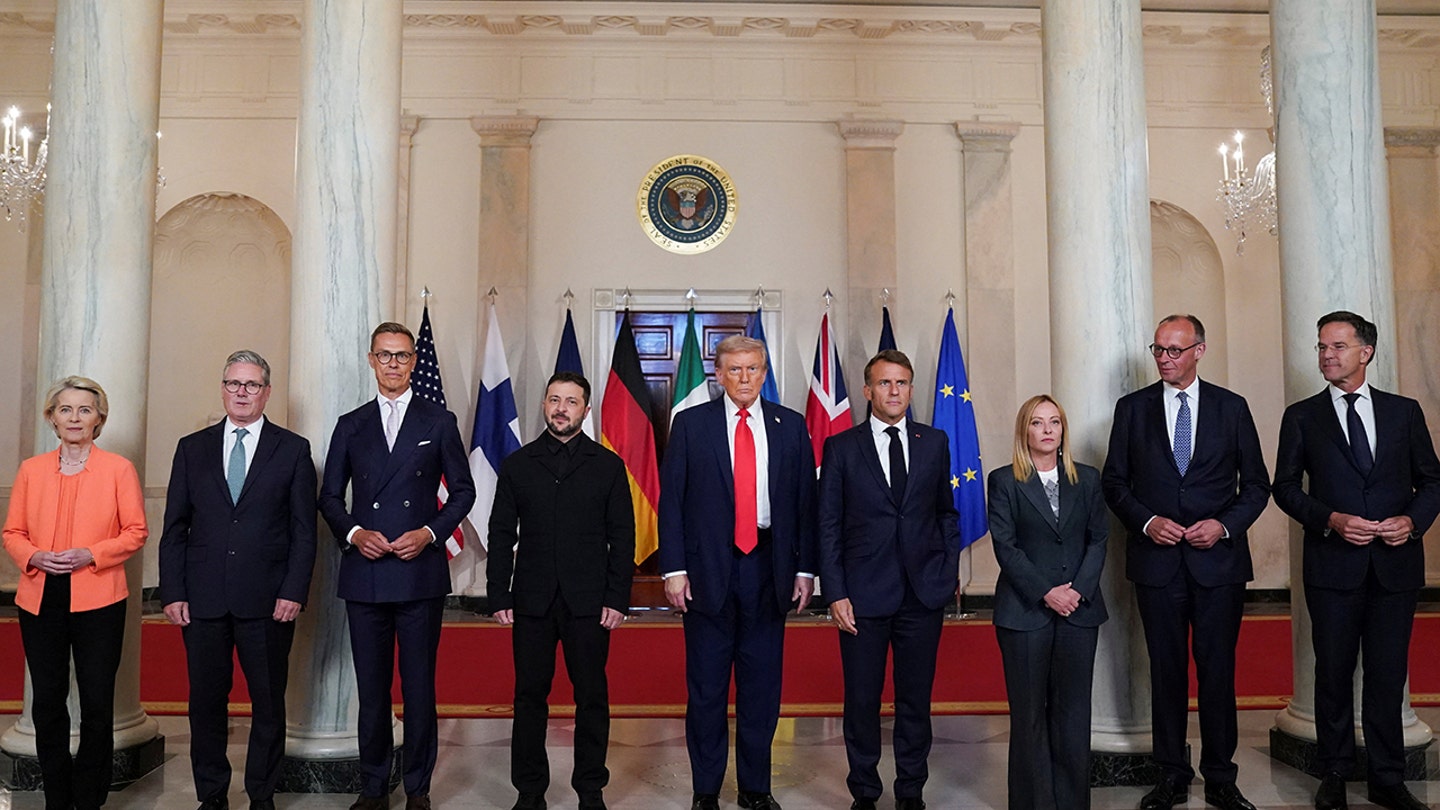
MORNING GLORY: Can President Trump deliver a ceasefire or even a peace agreement between Russia and Ukraine?
Entities mentioned:
- Donald Trump: Power, Influence, Legacy
- Vladimir Putin: Power, Control, Influence
- Volodymyr Zelenskyy: Duty, Self-preservation, Unity
- Donald Rumsfeld: Professional pride, Influence, Security
- Hugh Hewitt: Influence, Professional pride, Curiosity
- Media: Recognition, Influence, Greed
Article Assessment:
Credibility Score: 70/100
Bias Rating: 65/100 (Lean Right)
Sentiment Score: 55/100
Authoritarianism Risk: 35/100 (Generally Democratic)
Bias Analysis:
The article leans right due to its favorable portrayal of Trump's diplomatic efforts and criticism of media reporting. However, it maintains some balance by emphasizing the uncertainty of outcomes and citing examples of successful diplomacy.
Key metric: Diplomatic Influence
As a social scientist, I analyze that this article primarily focuses on the uncertainty surrounding diplomatic negotiations between the US, Russia, and Ukraine. The author, Hugh Hewitt, emphasizes the importance of acknowledging the limits of public knowledge in high-stakes diplomacy. He criticizes media sources claiming inside knowledge of these meetings, suggesting that such claims are either misinformation or clickbait. The article indirectly highlights the potential for US diplomatic influence, particularly through Trump's involvement, but cautions against premature conclusions. This measured approach to assessing diplomatic progress could impact the US's perceived diplomatic influence on the global stage, especially in conflict resolution efforts.

The common thread in Trump’s latest moves: squeezing big blue cities
Entities mentioned:
- Donald Trump: Power, Control, Revenge
- Democratic Party: Self-preservation, Unity, Resistance
- Republican Party: Power, Control, Loyalty
- ICE: Duty, Control, Security
- National Guard: Duty, Security, Control
- Big Cities: Self-preservation, Resistance, Unity
Article Assessment:
Credibility Score: 70/100
Bias Rating: 35/100 (Lean Left)
Sentiment Score: 25/100
Authoritarianism Risk: 70/100 (Authoritarian Tendencies)
Bias Analysis:
The article leans left, presenting Trump's actions as primarily negative for cities. While it includes some factual information and expert opinions, the language and framing consistently portray Trump's policies as harmful to urban areas and beneficial to his political goals.
Key metric: Urban-Rural Political Divide
As a social scientist, I analyze that this article highlights a growing trend of federal intervention in urban governance, potentially exacerbating the urban-rural political divide in the United States. The actions described, such as deploying federal forces to cities and redistricting efforts, appear to be systematically reducing the political influence of large metropolitan areas. This could lead to decreased representation for urban populations in national politics, despite their significant contributions to economic growth and innovation. The approach may also intensify social tensions and challenge the traditional balance of federal-local power dynamics in the US political system.

Trump cranks up pressure on Zelensky ahead of his high-stakes White House return
Entities mentioned:
- Donald Trump: Power, Legacy, Recognition
- Vladimir Putin: Power, Control, Influence
- Volodymyr Zelensky: Self-preservation, Duty, Determination
- Steve Witkoff: Loyalty, Duty, Influence
- European leaders: Security, Unity, Wariness
Article Assessment:
Credibility Score: 75/100
Bias Rating: 45/100 (Center)
Sentiment Score: 35/100
Authoritarianism Risk: 55/100 (Mixed/Neutral)
Bias Analysis:
The article presents multiple perspectives and voices, including critics and supporters of Trump's approach. However, there's a slight lean towards skepticism of Trump's methods, balanced by inclusion of administration claims.
Key metric: International Relations and Diplomacy
As a social scientist, I analyze that this article highlights a complex diplomatic situation surrounding the Russia-Ukraine conflict, with Trump playing a central role in negotiations. The article suggests a potential shift in U.S. policy towards favoring Russian interests, which could significantly impact global alliances and the balance of power in Eastern Europe. Trump's approach, characterized by personal diplomacy and unconventional tactics, is creating tension between the U.S., Ukraine, and European allies. This situation could lead to a realignment of international relationships and potentially alter the trajectory of the conflict, with far-reaching implications for global security and diplomatic norms.

Why Trump deserves credit for his Ukraine push — and why it may all fall apart
Entities mentioned:
- Donald Trump: Power, Recognition, Legacy
- Volodymyr Zelensky: Self-preservation, Unity, Determination
- Vladimir Putin: Power, Control, Influence
- European Leaders: Unity, Security, Influence
- Ukraine: Self-preservation, Freedom, Unity
- Russia: Power, Control, Influence
Article Assessment:
Credibility Score: 65/100
Bias Rating: 55/100 (Center)
Sentiment Score: 45/100
Authoritarianism Risk: 35/100 (Generally Democratic)
Bias Analysis:
The article presents a relatively balanced view, offering both praise and criticism of Trump's efforts. While it leans slightly towards skepticism of Trump's approach, it also acknowledges potential positive outcomes.
Key metric: International Relations and Diplomacy
As a social scientist, I analyze that this article presents a complex situation regarding Trump's efforts to broker peace between Ukraine and Russia. The article highlights the potential for diplomatic progress while also emphasizing the significant challenges and contradictions in Trump's approach. It suggests that while Trump's unconventional methods may have led to some positive developments, there are substantial obstacles to overcome, including territorial disputes, security guarantees, and conflicting interests among the involved parties. The analysis also points out the delicate balance Trump must maintain between appeasing various stakeholders, which may prove unsustainable in the long run. The article raises questions about Trump's true motivations and understanding of the situation, particularly in his interactions with Putin.

Takeaways from Trump’s meetings with Zelensky and European leaders
Entities mentioned:
- Donald Trump: Power, Influence, Legacy
- Volodymyr Zelensky: Security, Determination, Unity
- Vladimir Putin: Power, Control, Influence
- Emmanuel Macron: Unity, Influence, Security
- Friedrich Merz: Unity, Security, Duty
- JD Vance: Loyalty, Duty, Influence
- Marco Rubio: Duty, Influence, Ambition
- Steve Witkoff: Duty, Loyalty, Influence
Article Assessment:
Credibility Score: 75/100
Bias Rating: 55/100 (Center)
Sentiment Score: 55/100
Authoritarianism Risk: 40/100 (Generally Democratic)
Bias Analysis:
The article presents a relatively balanced view of the events, including multiple perspectives from different leaders. While it focuses heavily on Trump's actions and statements, it also includes European viewpoints and Ukrainian reactions.
Key metric: Diplomatic Influence
As a social scientist, I analyze that this article highlights a significant shift in U.S. foreign policy approach towards the Russia-Ukraine conflict. Trump's willingness to consider U.S. troop involvement in security guarantees for Ukraine marks a departure from his previous isolationist stance. This change could potentially increase U.S. diplomatic influence in Europe and alter the dynamics of peace negotiations. The hastily arranged meetings with European leaders and Zelensky demonstrate the urgency of the situation and the central role the U.S. is playing in peace efforts. However, Trump's reversal on the need for an immediate ceasefire indicates a potential misalignment with European allies, which could impact the cohesiveness of the Western response to the conflict. The article also reveals the delicate balance of personal diplomacy, as evidenced by the improved atmosphere in the Zelensky-Trump meeting compared to their previous encounter.

Bondi, Patel bring in Missouri AG to serve as FBI co-deputy director with Dan Bongino
Entities mentioned:
- Pam Bondi: Power, Control, Influence
- Kash Patel: Power, Loyalty, Control
- Andrew Bailey: Ambition, Loyalty, Duty
- Dan Bongino: Self-preservation, Pride, Influence
- Donald Trump: Power, Control, Legacy
- Todd Blanche: Loyalty, Professional pride, Influence
- FBI: Control, Security, Power
Article Assessment:
Credibility Score: 65/100
Bias Rating: 70/100 (Lean Right)
Sentiment Score: 55/100
Authoritarianism Risk: 65/100 (Authoritarian Tendencies)
Bias Analysis:
The article leans right due to its heavy reliance on Fox News as a source and its focus on Trump-aligned figures. The framing of the story and the language used suggest a favorable view of the changes in FBI leadership.
Key metric: Government Integrity and Accountability
As a social scientist, I analyze that this article reveals significant changes in the leadership structure of the FBI, a key institution in U.S. law enforcement. The appointment of a co-deputy director, especially one with strong political ties, suggests a potential shift in the FBI's operational dynamics and its relationship with the executive branch. This unusual move may impact the FBI's independence and could be seen as an attempt to exert more political control over the agency. The involvement of figures like Bondi and Patel, known for their loyalty to Trump, along with Bailey's explicit gratitude to Trump, indicates a possible politicization of the FBI's upper echelons. This development could have far-reaching implications for the integrity of federal law enforcement and the separation of powers, potentially eroding public trust in these institutions.

5 key moments inside Trump’s ‘big day’ with Zelenskyy, European leaders
Entities mentioned:
- Donald Trump: Power, Influence, Legacy
- Volodymyr Zelenskyy: Determination, Unity, Self-preservation
- Vladimir Putin: Power, Control, Influence
- JD Vance: Duty, Loyalty, Professional pride
- Ursula von der Leyen: Unity, Security, Peace
- Friedrich Merz: Unity, Security, Peace
- Emmanuel Macron: Unity, Security, Obligation
Article Assessment:
Credibility Score: 70/100
Bias Rating: 65/100 (Lean Right)
Sentiment Score: 65/100
Authoritarianism Risk: 35/100 (Generally Democratic)
Bias Analysis:
The article leans slightly right, focusing heavily on Trump's actions and portraying them in a generally positive light. While it includes multiple perspectives, the framing tends to emphasize Trump's leadership and diplomatic efforts.
Key metric: International Relations and Diplomacy
As a social scientist, I analyze that this article highlights a significant shift in diplomatic approach towards the Russia-Ukraine conflict. Trump's meetings with European leaders and Zelenskyy demonstrate an attempt to broker peace without a ceasefire, which is unconventional. The united European front and Trump's emphasis on Europe taking more responsibility for Ukraine's security indicate a potential realignment of international roles in the conflict. The article suggests a move towards more direct negotiations between conflicting parties, with the U.S. playing a facilitating role. This approach could significantly impact the trajectory of the conflict and reshape international diplomatic norms in conflict resolution.

Five GOP-led states to send hundreds of National Guard troops to DC as White House escalates police takeover
Entities mentioned:
- Donald Trump: Power, Control, Security
- Patrick Morrisey: Duty, Loyalty, Security
- Henry McMaster: Loyalty, Duty, Security
- Mike DeWine: Duty, Security, Obligation
- Muriel Bowser: Self-preservation, Justice, Freedom
- Sean Curran: Duty, Security, Professional pride
- Robert White: Moral outrage, Justice, Freedom
- Alan Dent: Moral outrage, Justice, Freedom
- Pam Bondi: Power, Control, Loyalty
- Terry Cole: Duty, Power, Control
- Pamela Smith: Professional pride, Duty, Security
Article Assessment:
Credibility Score: 75/100
Bias Rating: 45/100 (Center)
Sentiment Score: 35/100
Authoritarianism Risk: 65/100 (Authoritarian Tendencies)
Bias Analysis:
The article presents multiple viewpoints, including those of the federal government, state governors, and local officials. While it includes criticism of the federal actions, it also provides the administration's justifications, maintaining a relatively balanced perspective.
Key metric: Political Stability Index
As a social scientist, I analyze that this article highlights a significant escalation in federal intervention in local law enforcement, particularly in Washington, DC. The deployment of National Guard troops from multiple states, coupled with the attempted federal takeover of the DC police force, suggests a dramatic shift in the balance of power between federal and local authorities. This move raises concerns about the erosion of local autonomy and the potential for increased authoritarianism. The justification of addressing crime rates, despite evidence of lower overall crime numbers, indicates a possible disconnect between the stated reasons and actual motivations for these actions. This situation could lead to increased tensions between federal and local governments, potentially impacting the overall political stability of the nation. The resistance from local officials and citizens, as well as legal challenges, demonstrates the complex interplay of federal power, states' rights, and local governance in the American system.

Senate signals readiness to hit Russia with hard sanctions if peace deal fails
Entities mentioned:
- President Donald Trump: Power, Influence, Legacy
- Ukrainian President Volodymyr Zelenskyy: Self-preservation, Duty, Unity
- Russian President Vladimir Putin: Power, Control, Influence
- Senate Republicans: Loyalty, Determination, Security
- Senate Democrats: Moral outrage, Justice, Wariness
- Congress: Control, Influence, Duty
Article Assessment:
Credibility Score: 70/100
Bias Rating: 55/100 (Center)
Sentiment Score: 45/100
Authoritarianism Risk: 35/100 (Generally Democratic)
Bias Analysis:
The article presents views from both Republican and Democratic senators, providing a relatively balanced perspective. However, there's a slight emphasis on Republican viewpoints, with more detailed quotes and positive framing of Trump's actions.
Key metric: International Relations and Diplomacy
As a social scientist, I analyze that this article highlights the complex interplay between domestic politics and international diplomacy in the context of the Russia-Ukraine conflict. The Senate's readiness to impose sanctions on Russia reflects a bipartisan consensus on the need for a strong U.S. response, should diplomatic efforts fail. This stance potentially strengthens the U.S. negotiating position but also risks escalating tensions. The divergent views between Republicans and Democrats on Trump's approach underscore the polarized nature of U.S. politics, even in foreign policy matters. This internal division could potentially weaken the U.S.'s ability to present a unified front in international negotiations. The article also reveals the delicate balance between pursuing diplomatic solutions and maintaining a credible threat of economic penalties, showcasing the multifaceted nature of modern international relations.

Trump calls White House talks 'very good, early step' toward Russia-Ukraine peace: Here's what's next
Entities mentioned:
- Donald Trump: Influence, Legacy, Recognition
- Volodymyr Zelenskyy: Self-preservation, Unity, Security
- Vladimir Putin: Power, Control, Influence
- JD Vance: Duty, Professional pride
- Marco Rubio: Duty, Influence
- Steve Witkoff: Duty, Professional pride
- Friedrich Merz: Righteousness, Influence
Article Assessment:
Credibility Score: 65/100
Bias Rating: 65/100 (Lean Right)
Sentiment Score: 60/100
Authoritarianism Risk: 40/100 (Generally Democratic)
Bias Analysis:
The article leans right, focusing heavily on Trump's role and quoting him extensively. While it includes other perspectives, the framing tends to portray Trump's efforts in a positive light.
Key metric: International Conflict Resolution
As a social scientist, I analyze that this article portrays a significant shift in the dynamics of the Russia-Ukraine conflict, with Trump positioning himself as a key mediator. The potential for direct talks between Putin and Zelenskyy, facilitated by Trump, represents a major diplomatic development. However, the article also highlights the complexities involved, including the sensitive issue of territorial concessions and the divergent security interests of Ukraine and Russia. The emphasis on European nations providing security guarantees, with U.S. support primarily through arms sales, indicates a potential realignment of international involvement in the conflict. This approach could have far-reaching implications for U.S. foreign policy and global power dynamics.